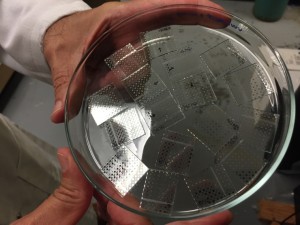
The new hybrid sol-gel material provides an electrical energy storage capacity rivaling some batteries.
Image: John Toon/Georgia Tech
The future of electric vehicle and defibrillator technologies depend largely on new, innovative energy storage research and improving device power densities. With the high demand for more powerful, efficient energy devices, the researchers from Georgia Tech believe they may have developed what could be the answer to powering large-scale devices.
The team has developed a new capacitor dielectric material. This capacitor—developed from a hybrid silica sol-gel material and self-assembled monolayers of common fatty acid—has the potential to surpass some of today’s conventional batteries in the field of energy and power density.
If the researchers can scale up their current laboratory sample, the new capacitors will be able to provide large amounts of current quickly to large-scale applications.
This from Georgia Tech:
The new material is composed of a silica sol-gel thin film containing polar groups linked to the silicon atoms and a nanoscale self-assembled monolayer of an octylphosphonic acid, which provides insulating properties. The bilayer structure blocks the injection of electrons into the sol-gel material, providing low leakage current, high breakdown strength and high energy extraction efficiency.

